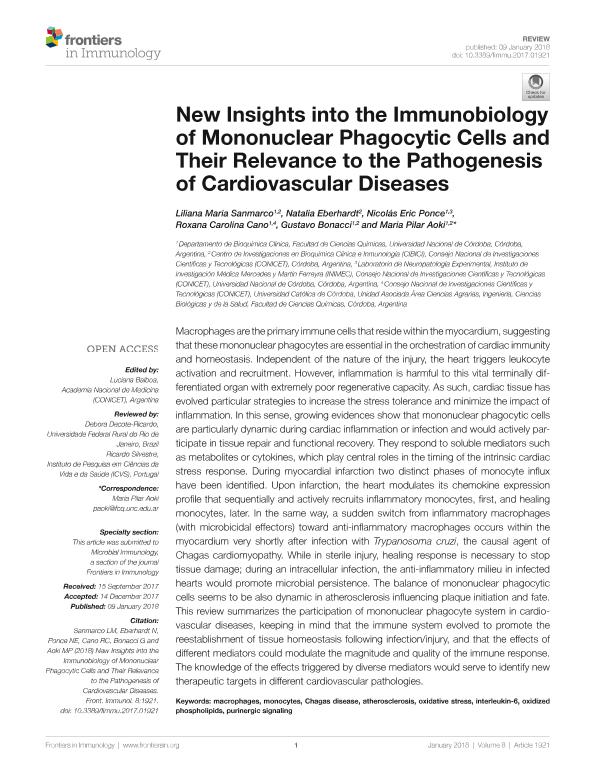Mostrar el registro sencillo del ítem
dc.contributor.author
Sanmarco, Liliana Maria

dc.contributor.author
Eberhardt, Natalia

dc.contributor.author
Ponce, Nicolás Eric

dc.contributor.author
Cano, Roxana Carolina

dc.contributor.author
Bonacci, Gustavo Roberto

dc.contributor.author
Aoki, Maria del Pilar

dc.date.available
2019-10-18T12:38:21Z
dc.date.issued
2018-01
dc.identifier.citation
Sanmarco, Liliana Maria; Eberhardt, Natalia; Ponce, Nicolás Eric; Cano, Roxana Carolina; Bonacci, Gustavo Roberto; et al.; New insights into the immunobiology of mononuclear phagocytic cells and their relevance to the pathogenesis of cardiovascular diseases; Frontiers Media S.A.; Frontiers in Immunology; 8; 1-2018
dc.identifier.uri
http://hdl.handle.net/11336/86278
dc.description.abstract
Macrophages are the primary immune cells that reside within the myocardium, suggesting that these mononuclear phagocytes are essential in the orchestration of cardiac immunity and homeostasis. Independent of the nature of the injury, the heart triggers leukocyte activation and recruitment. However, inflammation is harmful to this vital terminally differentiated organ with extremely poor regenerative capacity. As such, cardiac tissue has evolved particular strategies to increase the stress tolerance and minimize the impact of inflammation. In this sense, growing evidences show that mononuclear phagocytic cells are particularly dynamic during cardiac inflammation or infection and would actively participate in tissue repair and functional recovery. They respond to soluble mediators such as metabolites or cytokines, which play central roles in the timing of the intrinsic cardiac stress response. During myocardial infarction two distinct phases of monocyte influx have been identified. Upon infarction, the heart modulates its chemokine expression profile that sequentially and actively recruits inflammatory monocytes, first, and healing monocytes, later. In the same way, a sudden switch from inflammatory macrophages (with microbicidal effectors) toward anti-inflammatory macrophages occurs within the myocardium very shortly after infection with Trypanosoma cruzi, the causal agent of Chagas cardiomyopathy. While in sterile injury, healing response is necessary to stop tissue damage; during an intracellular infection, the anti-inflammatory milieu in infected hearts would promote microbial persistence. The balance of mononuclear phagocytic cells seems to be also dynamic in atherosclerosis influencing plaque initiation and fate. This review summarizes the participation of mononuclear phagocyte system in cardiovascular diseases, keeping in mind that the immune system evolved to promote the reestablishment of tissue homeostasis following infection/injury, and that the effects of different mediators could modulate the magnitude and quality of the immune response. The knowledge of the effects triggered by diverse mediators would serve to identify new therapeutic targets in different cardiovascular pathologies.
dc.format
application/pdf
dc.language.iso
eng
dc.publisher
Frontiers Media S.A.
dc.rights
info:eu-repo/semantics/openAccess
dc.rights.uri
https://creativecommons.org/licenses/by-nc-sa/2.5/ar/
dc.subject
ATHEROSCLEROSIS
dc.subject
CHAGAS DISEASE
dc.subject
INTERLEUKIN-6
dc.subject
MACROPHAGES
dc.subject
MONOCYTES
dc.subject
OXIDATIVE STRESS
dc.subject
OXIDIZED PHOSPHOLIPIDS
dc.subject
PURINERGIC SIGNALING
dc.subject.classification
Inmunología

dc.subject.classification
Medicina Básica

dc.subject.classification
CIENCIAS MÉDICAS Y DE LA SALUD

dc.subject.classification
Otras Ciencias Médicas

dc.subject.classification
Otras Ciencias Médicas

dc.subject.classification
CIENCIAS MÉDICAS Y DE LA SALUD

dc.title
New insights into the immunobiology of mononuclear phagocytic cells and their relevance to the pathogenesis of cardiovascular diseases
dc.type
info:eu-repo/semantics/article
dc.type
info:ar-repo/semantics/artículo
dc.type
info:eu-repo/semantics/publishedVersion
dc.date.updated
2019-10-16T18:00:26Z
dc.identifier.eissn
1664-3224
dc.journal.volume
8
dc.journal.pais
Suiza

dc.description.fil
Fil: Sanmarco, Liliana Maria. Consejo Nacional de Investigaciones Científicas y Técnicas. Centro Científico Tecnológico Córdoba. Centro de Investigaciones en Bioquímica Clínica e Inmunología; Argentina
dc.description.fil
Fil: Eberhardt, Natalia. Consejo Nacional de Investigaciones Científicas y Técnicas. Centro Científico Tecnológico Córdoba. Centro de Investigaciones en Bioquímica Clínica e Inmunología; Argentina
dc.description.fil
Fil: Ponce, Nicolás Eric. Consejo Nacional de Investigaciones Científicas y Técnicas. Centro Científico Tecnológico Córdoba. Centro de Investigaciones en Bioquímica Clínica e Inmunología; Argentina
dc.description.fil
Fil: Cano, Roxana Carolina. Universidad Nacional de Córdoba; Argentina. Universidad Catolica Argentina; Argentina
dc.description.fil
Fil: Bonacci, Gustavo Roberto. Consejo Nacional de Investigaciones Científicas y Técnicas. Centro Científico Tecnológico Córdoba. Centro de Investigaciones en Bioquímica Clínica e Inmunología; Argentina
dc.description.fil
Fil: Aoki, Maria del Pilar. Consejo Nacional de Investigaciones Científicas y Técnicas. Centro Científico Tecnológico Córdoba. Centro de Investigaciones en Bioquímica Clínica e Inmunología; Argentina
dc.journal.title
Frontiers in Immunology
dc.relation.alternativeid
info:eu-repo/semantics/altIdentifier/url/https://www.ncbi.nlm.nih.gov/pubmed/29375564
dc.relation.alternativeid
info:eu-repo/semantics/altIdentifier/doi/http://dx.doi.org/10.3389/fimmu.2017.01921
Archivos asociados
